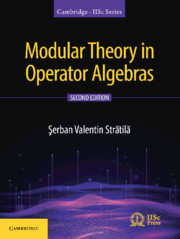Book contents
- Frontmatter
- Dedication
- Contents
- Preface to the Second Edition
- Preface to the First Edition
- Chapter I Normal Weights
- Chapter II Conditional Expectations and Operator-Valued Weights
- Chapter III Groups of Automorphisms
- Chapter IV Crossed Products
- Chapter V Continuous Decompositions
- Chapter VI Discrete Decompositions
- Appendix
- References
- Notation Index
- Subject Index
Preface to the Second Edition
Published online by Cambridge University Press: 16 October 2020
- Frontmatter
- Dedication
- Contents
- Preface to the Second Edition
- Preface to the First Edition
- Chapter I Normal Weights
- Chapter II Conditional Expectations and Operator-Valued Weights
- Chapter III Groups of Automorphisms
- Chapter IV Crossed Products
- Chapter V Continuous Decompositions
- Chapter VI Discrete Decompositions
- Appendix
- References
- Notation Index
- Subject Index
Summary
The first edition of this book appeared in 1981 as a direct continuation of Lectures of von Neumann Algebras by Ş.V. Strătilă and L. Zsidó and, until 2003, was the only comprehensive monograph on the subject.
The book Lectures on von Neumann Algebras, 2nd Edition, Cambridge University Press, 2019, will be always referred to as [L]. It is assumed that the reader is familiar with the material contained in this book, including the terminology and notation.
The present book contains the continuous decomposition and the discrete decomposition for factors of type III and all the necessary results such as the extensive theory of normal weights including the U. Haagerup characterization of normality, the A. Connes theorem of Radon–Nikodym type and the Pedersen–Takesaki construction, the conditional expectations and the operator-valued weights, a detailed consideration of groups of automorphisms and their spectral theory, and the theory of crossed products. In order to include our extension of the Takesaki duality theorem to noncommutative groups of automorphisms, we considered a simultaneous generalization of groups and duals of groups, namely the Kac algebras, and their actions on von Neumann algebras, as well as the corresponding crossed products. Instead of Kac algebras we can also consider quantum groups, the arguments being exactly the same as for Kac algebras.
In this second edition we added information and references for several results, which appeared after 1981, untill now, including A. Ocneanu's theorem concerning actions of amenable groups and its extensions, H. Kosaki's extension of the index to arbitrary factors and F. Rădulescu's examples of non-hyperfinite factors of type III, and of type III1 relying on D.-V. Voiculescu's theory of free probability.
For subjects such as the equivalence of injectivity and hyperfiniteness (originally due to A. Connes) we indicate references for more recent shorter proofs. This guarantees the uniqueness of the hyperfinite factor of type II∞ and of type factors,. Another important result which could not be considered in detail, due to its length, is the proof of U. Haagerup of the A. Connes conjecture that the hyperfinite factor of type III1 is unique.
- Type
- Chapter
- Information
- Modular Theory in Operator Algebras , pp. ix - xPublisher: Cambridge University PressPrint publication year: 2020



